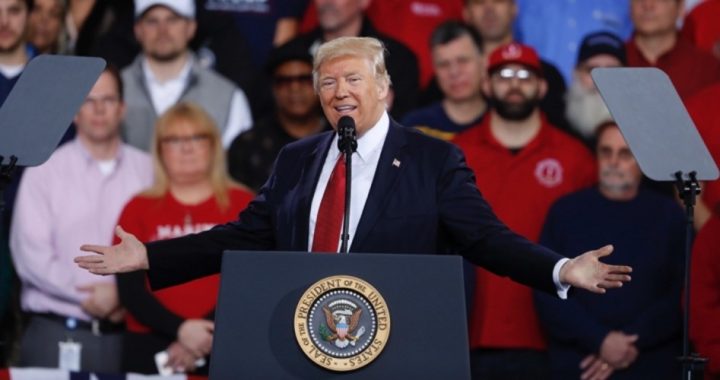
During a speech to automobile company executives and workers in Ypsilanti, Michigan on Wednesday, President Trump promised to restore the federal government’s mid-term review of the federal fuel efficiency standards that former President Obama cancelled just before leaving office.
The presidential event was held at Willow Run, which is home to the American Center for Mobility, a testing center for self-driving vehicles. The building was once a General Motors automobile transmission plant, and prior to that it was used by the Ford Motor Company to build B-24 bombers during World War II.
Speaking to an enthusiastic audience, Trump expressed how wonderful he felt to be there with the “leaders, workers, engineers and suppliers of Ford, and Fiat-Chrysler, and General Motors, and many others.”
Almost immediately, Trump told his audience: “I’m sure you’ve all heard the big news that we’re going to work on the CAFE standards, so you can make cars in America again. We’re going to help the companies, and they’re going to help you.”
CAFE stands Corporate Average Fuel Economy. CAFE standards are regulations first enacted by the U.S. Congress in 1975 after the 1973-74 Arab Oil Embargo, that required improved average fuel economy of cars and light trucks produced for sale in the United States.
Before delving into specifics, Trump talked about how he reached out to leaders of the automobile industry who had been neglected by his predecessors:
During my first week in office, I brought American auto companies to the White House. [General Motors CEO] Mary Barra is here. [Ford CEO] Mark Fields is here. [Fiat Chrysler CEO] Sergio [Marchionne] is here, and others. And none of them ever got to see the Oval Office before, because nobody took them into the Oval Office — our presidents.
They employ tens of thousands of people, but I brought them into the Oval Office because they’re going to be expanding their companies.
But they all told me the same thing. They explained that the previous administration promised you a so-called “mid-term review” of the federal fuel efficiency standards. It was necessary because the standards were set far into the future — way, way into the future. If the standards threatened auto jobs, then commonsense changes could have and should have been made.
Just days before my inauguration, the previous administration cut short the promised mid-term review in an 11th-hour executive action. Today, I am announcing that we are going to cancel that executive action.
We are going to restore the originally scheduled mid-term review, and we are going to ensure that any regulations we have protect and defend your jobs, your factories. We’re going to be fair. We’re going to be fair.
While the implied relaxation of the fuel efficiency standards was the big news, Trump also talked about others areas where his administration could help bring automotive jobs back to Michigan and the rest of America. One such area was trade deals such as NAFTA — a favorite topic of his during his presidential campaign last year.
The president told his audience:
Since NAFTA was approved, we’ve lost nearly one-third of our manufacturing jobs in the United States. Since China entered the World Trade Organization, we’ve lost 60,000 factories. Hard to believe. Our trade deficit last year reached nearly $800 billion. Who’s making these deals? I can take anybody in the audience — you’ll do better, believe me.
That last remark was met with laughter from the crowd.
Trump spoke of NAFTA’s impact on the auto industry, observing that before NAFTA went into effect there were 280,000 autoworkers in Michigan, but that today, that number is roughly 165,000.
The president went on to suggest a new economic model that he proposes calling “The American Model.”
Under this system, he explained, “we will reduce burdens on our companies and on our businesses. But, in exchange, companies must hire and grow in America. They have to hire and grow in our country.”
Trump also spoke about how he had ended U.S. participation in the TPP:
The Trans-Pacific Partnership — another disaster — threatened states like Michigan, Wisconsin, Ohio, Pennsylvania, and so many others with the loss of countless more jobs. That is why I’m proud to say I followed through on my promise … and immediately withdrew the United States from the TPP. I kept my word. The assault on the American auto industry, believe me, is over.
After leaving Michigan, Trump headed to Nashville, Tennessee, to lay a wreath at President Andrew Jackson’s tomb to mark what would have been Jackson’s 250th birthday. He took advantage of that upcoming visit by seemingly floating the idea of possible tariffs in the future, though he did not specifically propose one in his talk. He said:
In supporting tariffs, Jackson said, “I look at the tariff with an eye to the proper distribution of labor, and to revenue, and with a view to discharge our national debt.” We owe $20 trillion — $20 trillion with our policies. America cannot be a wealthy country if special interests game the system to profit from the exodus of our companies and from the exodus of our jobs.
Trump’s Michigan speech was tailor-made for a part of the country that has probably seen the worst ill effects of foreign economic competition of any other. His strong call for auto-friendly, protectionist policies surely was well received by these industry personnel in Michigan.
Photo of President Trump speaking at the American Center for Mobility, Ypsilanti Township, Mich., March 15, 2017: AP Images
Related articles:
Trump Orders EPA Review of “Horrible” Obama Water Decree
Obama Administration’s New EPA Rules Expand Control Over All Waterways
EPA Water Police Coming to Your Farm, Business — and Back Yard
STICKER SHOCK! Cost of UN Climate Pact: $100 TRILLION
Trump Picks Okla. Attorney General to Lead EPA: Big Win for Climate Realists, Constitutionalists
EPA Ex-boss Jackson Caught Breaking Law, Scamming U.S. Taxpayers
EPA Declares Human Breath (CO2) a Pollutant
Supreme Court Ruling: Victory for Property Owners, Defeat for EPA



